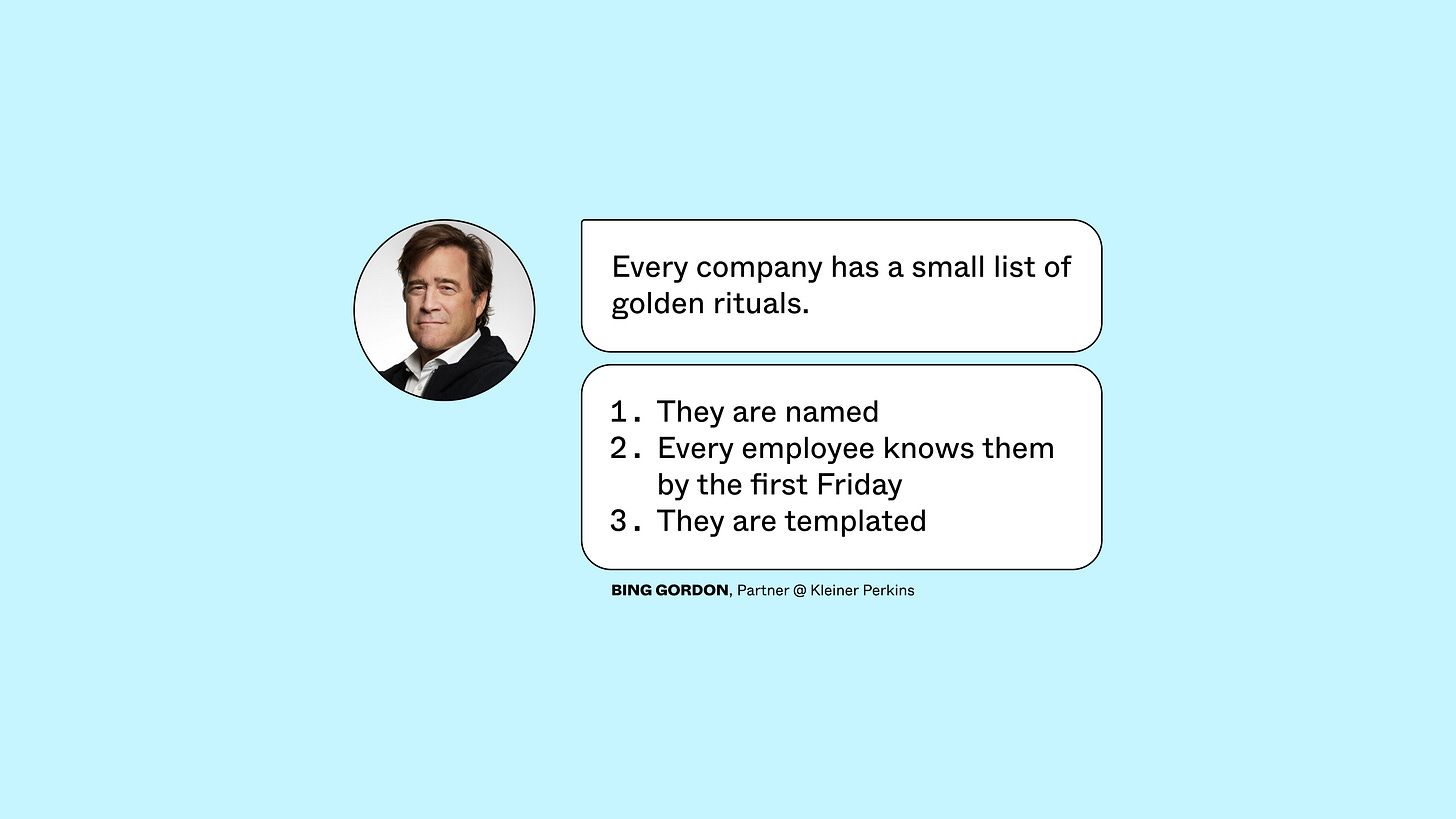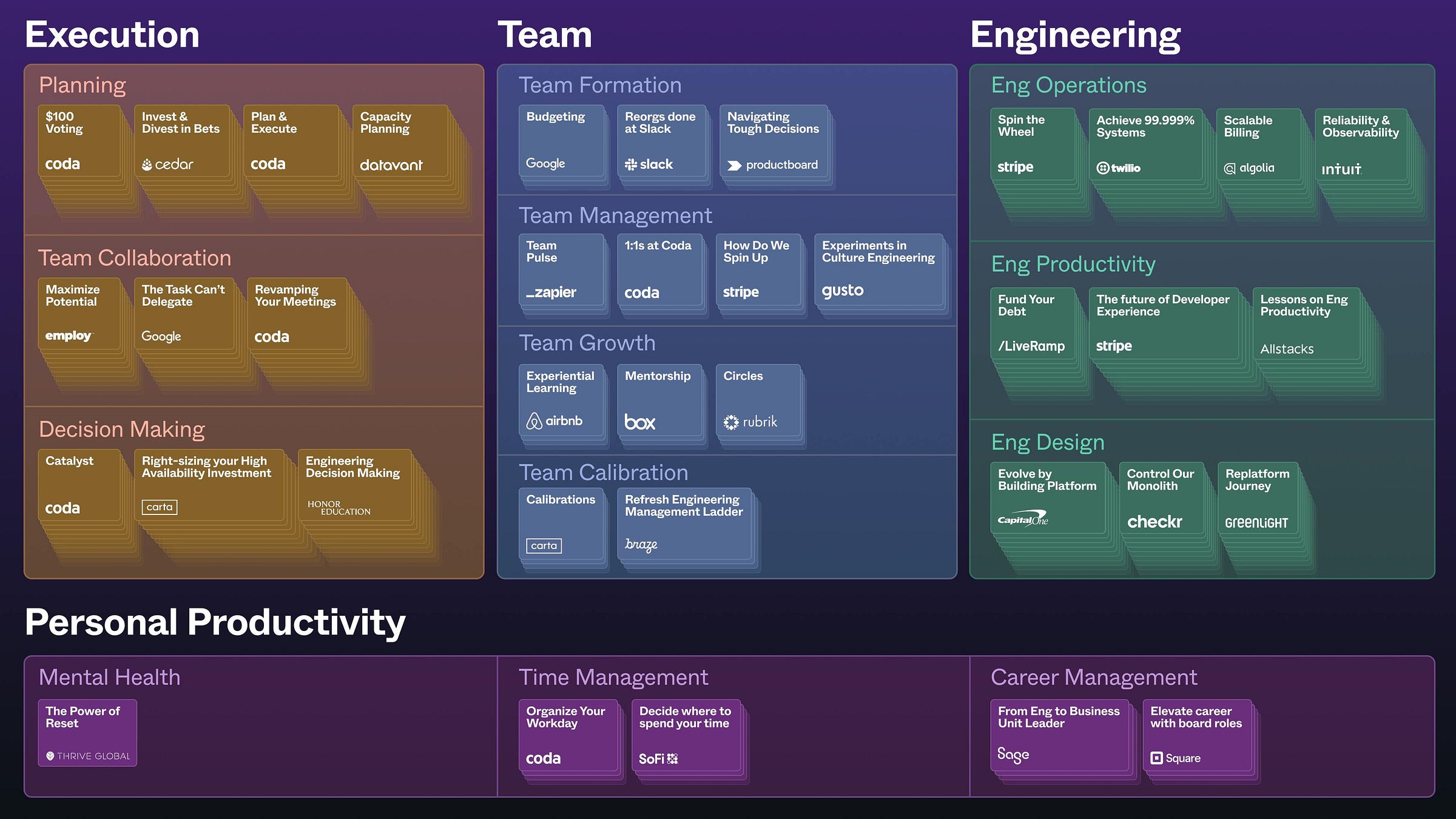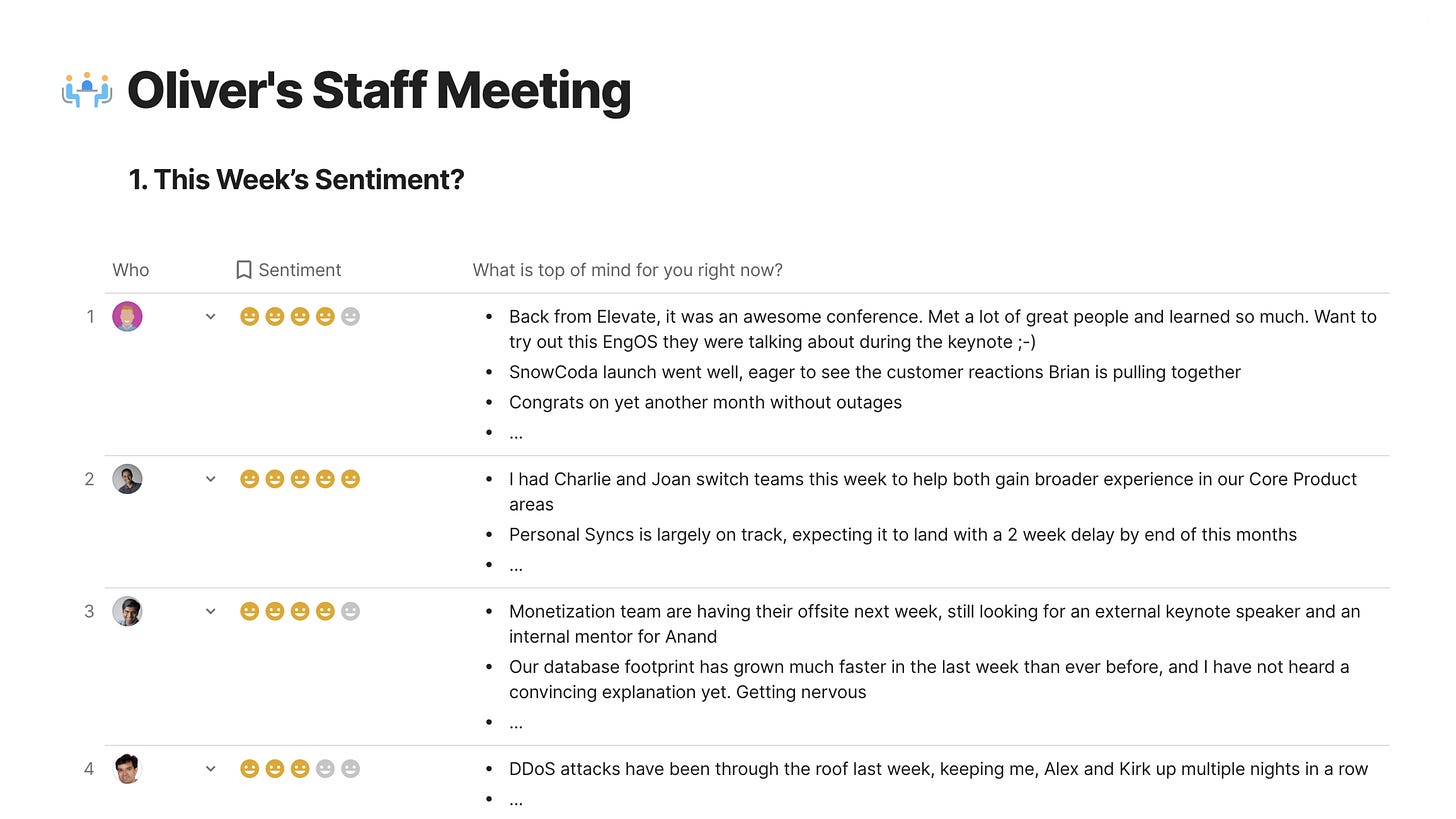Why your engineering team needs an operating system | Quang Hoang, Co-founder at Plato
No, we're not talking about Microsoft Windows
Hey Friends,
It’s been a little while, as I didn’t post last week because we were organizing the Elevate conference in San Francisco. It was a blast, and my brain is still processing the tremendous amount of wisdom I’ve gotten from it. Today’s edition is a bit special as well, because there’s no external guest: I’ll be sharing (a little) about our past at Plato, and (a lot) about our future with Coda, and how we envision engineering leadership in the next few years.
If you aren’t subscribed yet, you know what to do:
Let’s go!
2015-2024: The Story of Plato
I won’t go that much into detail, because I’ve already written extensively about the story of Plato. But it seems important to me to give some context about what we went through and why we stand where we stand now.
Back in 2015, my cofounders and I created Birdly, one of the first Slack bots in the world, when chatbots still weren’t a thing. In a few words, it was helping you with your expense reports, directly in a Slack chat. Somehow, our product caught people’s attention, and we went from 0 to around 15,000 users in just two weeks. We joined Y Combinator shortly after and moved to San Francisco, bringing 3 developers with us!
Overnight, we had to manage 3 developers who were barely younger than us. And as you’ve guessed, things didn’t go as expected. We were terrible managers.
And, guess what? They all quit, on the same day. That’s when we remembered the below quote and decided to become better managers:
“People don’t leave their companies, they leave their managers”
It was a hard lesson learned, but it led us to meet tens of engineering leaders, to understand what we did wrong and how we could improve. And that’s how we pivoted to create Plato, the mentorship platform for Engineering Leaders. We grew it to 1,400 mentors, but it didn’t scale further, because there isn’t an infinite number of quality mentors.
So over the years, Plato evolved, with a mission to spread engineering excellence. It evolved into a wonderful community, into meetups, into events like Elevate, into Q&As, or CTO dinners. But this couldn’t scale either. So we tried to bring the community online with blogs, videos, articles, etc. But it didn’t stick. People would listen to a podcast or watch a video, and go back to their day-to-day work. Everything we tried, either didn’t scale or didn’t stick, and we couldn’t find the right solution.
That is, until we met Shishir Mehrotra, CEO of Coda, at one of the Plato dinners.
2024-?: Coda & Plato
Meeting Shishir Mehrotra, CEO at Coda

The joint story of Coda and Plato actually started way before 2024. It started in 2019, when we invited Shishir Mehrotra, their CEO, to a Plato dinner. He was previously the CPO & CTO at YouTube. As young entrepreneurs, we’ve been stunned by his wisdom, and how he gave a lot of thought to all things engineering, both at YouTube and Coda.
That’s about when we started using Coda internally to structure our processes. If you’re not familiar with Coda, let’s say it’s the all-in-one digital workspace. It’s got the flexibility of collaborative documents, the structure of spreadsheets, the power of applications, the intelligence of AI, and enables anyone to create a doc as powerful as an app. (Note: Yes, it sounds like a sales pitch, but I didn’t find a better way to summarize it shortly.)
And so, we started using Coda for about everything. The Elevate Conference runs on Coda: we use it to monitor sales, manage the relationship with speakers, create campaigns to find sponsors, power the Elevate website content, sync with the production team, and much much more. We’ve also been using it as a Product/Engineering team. Our all-hands meetings, our weekly goals, our brainstorming sessions, our issues, our roadmap, our post-mortems, our 1-1s, etc.
When we set those up, I didn’t know all these had a name: Rituals.
Rituals
Shishir told me about how he used to sit on a startup board with Bing Gordon (Partner at Kleiner Perkins and ex-chief Creative Officer at EA). One day, Bing made a very interesting provocation: Great companies have a small list of Golden Rituals.

And rituals all share the same characteristics:
They are named
Every employee knows them by the first Friday
They are templated
Google indeed has OKRs, Salesforce has V2MOM, Amazon has 6-pagers and 2-pizza teams, Spotify has “Squads, tribes, chapters & guilds”, etc. Bing said that teams should put as much thought into their rituals as they are putting into their product. This is something Shishir got pretty obsessed with, and he interviewed 1000+ people to build a huge database of Rituals, which eventually became a book.
While we were trying to spread engineering excellence, we had several chats with Shishir about our internal rituals and how we could help engineering leaders through those rituals. We had started experimenting with Coda for our engineering community, for instance with a Career Ladder Coda doc, while improving our internal processes.
During a conversation with Shishir, an idea emerged: he had gathered insights on the rituals of some of the best companies and understood how these practices enhanced their organizational efficiency. Ultimately, that's the essence of Plato: learning from the best to make people and engineering organizations successful.
You see where I’m going: we had that Eurêka! moment and decided to work with Coda, to gather the best engineering rituals. That’s how Coda acquired Plato, and I’m excited to announce what we’ll work on during the next years: the EngOS.
Introducing the EngOS
Introducing the EngOS:
A collection of actionable rituals to run your engineering team.
Inspired by the best engineering leaders on the planet.
So, we’ve talked about Rituals already: those are repeated, structured activities or practices within an organization, that reinforce its culture, values, and goals.
The best engineering teams have developed those rituals to guide how their teams operate day after day. And after years of working closely with leaders, we’ve started to see a few patterns.
We’re compiling those rituals into EngOS: a collection of actionable rituals to run your engineering team. We’re drawing from the experience of the best engineering leaders on the planet, to create a system you can implement within your team (and not just read about!). In a nutshell: it’s your engineering team’s operating system.
It answers questions like:
How do we make decisions?
How do we handle tech debt?
How do we organize the engineering teams?
How do we define/update our career ladder?
We’ve split the EngOS into 4 main areas, each with rituals that solve the trickiest problems engineering teams have:
Execution: planning, making decisions, and collaborating with your team to execute 10x more.
Team: how to define and organize teams, manage them daily, and ensure teammates grow.
Engineering: how to organize your engineering operations, ensure eng productivity, and design (or redesign) your engineering for better output.
Personal Productivity: because we believe teams thrive when individuals thrive, this area helps everyone in engineering teams manage their mental health, time, and career.
A bit like an actual software OS works, these components can work separately, but when they are intertwined, the number of possibilities skyrocket.
We’ve imagined this operating system in a modular manner: each ritual is a template you can customize or build upon, choosing from a collection depending on your main challenges.
We’ve already released the first 6 rituals of the EngOS, and we’re going to bring hundreds more of them over the next few months and years. Below is a quick overview of 3 example rituals we’ve worked on, with some of the greatest engineering leaders we know. I won’t go much into detail as it is mostly to give you a sneak peek of what a ritual looks like.
Ritual 1: $100 Voting - Coda
The $100 voting ritual falls into the Execution category of the EngOS and solves planning issues.
When it comes to making important decisions, either teams have long debates or leadership has the last word. And simple prioritization frameworks aren’t capturing the depth of how teams feel.
Let’s take an example for quarterly planning:
Teams have 20 project requests
The engineering team has the capacity for only 3 of those
You ask people to rank requests by priority
They all end up being P0 and you don’t know which ones should make the cut.
When you use the $100 Voting system, or, as the very German Oliver Heckmann likes to call it, the Einhunderteuroabstimmungsmethode.
Here’s how it works:
Every stakeholder gets $100 to “invest” in different project requests
They can allocate their dollars any way they want, to as many project requests as they want
Once done, you check where the most dollars are spent and define priorities.
That’s a simple and straightforward ritual, but if you’re not using it, you can spend days debating on what’s important!
Ritual 2: Team Pulse - Zapier
Zapier is a fantastic company that helps people automate their tasks and connect tools. But sometimes, there’s a disconnection between what’s discussed at meetings and what’s important. Round-table updates can quickly become inefficient if nothing’s done.
With the right prompt, you can get the answers you want. That’s what Zapier calls their “Team Pulse”:
You ask your team about their overall sentiment this week, in a read-and-write manner.
You ask them what’s top of mind for them
And this way you can identify both the global team morale, the people who need help, and which issues could arise
You can also get the overall sentiment over time, spot trends, or see if there are discrepancies in sentiment between team members. Maybe some of them have a hard week and others could help.
That one’s also a simple example, but it can make a big difference in how you manage your engineering teams. It’ll help you avoid having people go into too much detail for a small issue and avoid missing the "metaphorical fires” that are about to break out.
Almost every week, something comes up in sentiment, that’s more urgent and important than the top item of the meeting’s agenda.
Ritual 3: Spin the Wheel - Stripe
When your time is limited and you can’t discuss all topics, how do you prioritize what you should be talking about? Without sparking intense debate, that is.
At Stripe, they have postmortem meetings every week, to learn from incidents that happened the week before. For a service as complex as Stripe, there’s an extremely wide range of issues. Some are just tiny blips while others can be very large. Every incident though, small or large, is important to discuss. But they don’t have time to go through all of them. If you only focus on large incidents, you’re at risk of seeing the small ones add up and become bigger.
So, the team at Stripe handles this through a ritual called “Spin the wheel”.
The team spins a wheel (virtual or not!) and picks a random incident to go through, and this has a few impacts:
From an efficiency perspective, it is a single-threaded discussion, which is crucial if you want everyone’s attention. And because you don’t know if you’ll be ‘picked’ by the wheel, you still have to prepare thoughtful post-mortems, no matter how important the issue is.
The second impact is cultural: it sends a clear signal that one of Stripe’s #1 customer expectations is the level of reliability of their tool. This means that not just the biggest issues must be solved. All the small ones can quickly add up.
If your team has time constraints when discussing postmortems (or other topics), the “Spin The Wheel” ritual might be adapted.
Wrapping it up
I think that with these examples, you start getting the hang of what a ritual looks like, and how those rituals solve actual problems.
We’re currently working on collecting dozens more and plan to release all of them to the EngOS users.
But as I said earlier, those templates are just the tip of the iceberg. They’re building blocks to get started, but the goal isn’t to use only rituals. All of these add up to become a holistic operating system: the EngOS. An operating system that’ll help you execute better, better manage your team, better manage your product, and better manage yourself.
The good news is that we’re opening it up to a few founding teams. If you’re interested in the EngOS, here’s what you’ll have access to:
All templates of rituals we’ve already built and all future rituals as well.
A Ritual Architect to customize all of them for your team
And, most of all, Engineering Leadership Experts (AKA domain knowledge experts) to understand your challenges and guide you in creating the perfect OS for your team.
If you want to learn more, apply below!
In the next few weeks, we’ll release detailed templates and tutorials to implement rituals in your company. Stay tuned!
That’s a wrap! This edition was a bit special, and I hope that you didn’t mind us explaining to you that big concept we’ll work on for the next few years. We’ll soon be collaborating with everyone who spoke at Elevate to create more actionable content for this newsletter!
Cheers,
Quang and the team at Plato/Coda
















I like the Eng OS framing!
I loved the $100 budget ritual and I'm probably using the idea in the next OKR planning :)